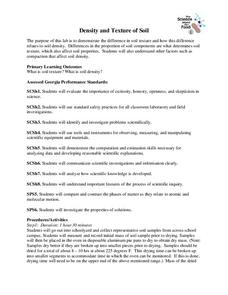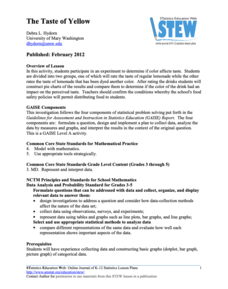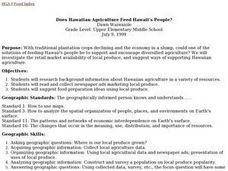Curated OER
Problem Solving: Metric Conversion
Using a table, students solve 12 word problems about the weights of various foods at the grocery store. The solve addition and subtraction problems as well as convert kilograms to grams.
Curated OER
Integrating Gandhian Principles of Communal Unity in Mathematics
Fourth through sixth graders incorporate Gandhian principles into Math curriculum. They explore Gandhi's teachings on communal unity and economic equality. This has quite a bit of information about Gandhi and his observations and...
University of Georgia
Density and Texture of Soil
All soil is not created equal! A lab activity asks learners to collect and analyze soil. Specific calculations determine the amount of sand, silt, and clay in a sample and allow individuals to identify the soil texture.
Nuffield Foundation
Investigating the Effects of Biochar on Soil Fertility
Breathe some new life into charcoal. Scholars use biochar to improve soil fertility. They test the effectiveness of this addition by conducting an experiment with soil having 0%, 2%, and 4% biochar.
Curated OER
Cartoons in the Classroom: Stagflation
What is stagflation? Have your social studies class examine this political cartoon to define stagflation and understand recession as its defined in a political context. This worksheet would be a great warm up activity, perfect for extra...
American Statistical Association
The Taste of Yellow
Does lemonade taste better when yellow? A tasty experiment has scholars determine the answer to the question. It requires conducting a taste test with lemonades of different colors (from food coloring), and then collecting and analyzing...
Howard Hughes Medical Institute
Beaks as Tools: Selective Advantage in Changing Environments
How does nature select some adaptations over others? Scholars experiment picking up seeds with two different types of tools simulating beaks. After practicing, they experience a drought where one type of seed suddenly isn't available....
Howard Hughes Medical Institute
Classroom Activities: What Is My Carbon Footprint?
Everyone leaves an impression on the world—some more than others. An interactive lesson has learners analyze their lifestyles and the impact they have on the environment. The analysis includes travel, food, and energy categories and ends...
Alabama Wildlife Federation
Big Fish, Little Fish
Tag, you're eaten! A lesson on predator-prey relationships uses the game freeze tag as a model. Learners become either a predator or prey and play a game of tag as the prey tries to reach areas that house food and shelter. During the...
Curated OER
Exercise and Nutrition
Learners maximize their exercise output by making healthy decisions concerning food. In this exercise and nutrition lesson, students identify types of food needed to give the body the highest energy output.
Global Oneness Project
Citizen Photojournalism
Matt Black's photo essay, "The Geography of Poverty" provides a shocking reminder of the poverty that exists in the United States. The resource not only focuses attention on poverty but also conditions that have given rise to situation...
Curated OER
China: Land Beyond the Wall
An excellent series of five lessons on China awaits you and your young geographers. In these lessons, learners engage in hands-on activities, watch streamed video, access websites, and complete activities in cooperative groups in order...
Curated OER
Diet Evaluation Project
Middle schoolers record two consecutive days of food intake. They identify which nutrients are below 70%. They compare diet composition between protein, fats, and carbohydrates. They evaluate fat in the diet to fall below the American...
Curated OER
Survey Says...
Young learners create and implement a school-wide survey about student body favorites! Learners record and analyze the data on a bar graph, picture graph, and line graph, and then display the data. Then, wrap it all up with a celebration...
Curated OER
Birds - Beaks and Feet
Second graders use an online database to research information about bird's beaks and feet. Using that information, they discover what foods they eat and where they live. In groups, they cluster the food/habitat and beak/feet data to make...
Curated OER
Color Mixing
Students experiment with primary colored water to mix new colors. They record new colors on a simple data sheet and share opinions on their work.
Curated OER
Lesson Plan 3: Great Book, Gross Book
It's time for your scholars to become book reviewers! Start with a fun review of foods: are they good or gross? Learners apply these evaluation techniques to books, recording their thoughts on large pieces of butcher paper. Simply have...
Curated OER
Feeding in the Flow
The National Oceanic and Atmospheric Administration (NOAA) has developed a tremendous library of ocean-themed lessons that can be used in a variety of science settings. "Feeding in the Flow" is one of those activities; Its focus is on...
Foundation for Water & Energy Education
How Can a Dam Affect a River? Activity B
Second in a pair of activities, young ecologists continue to examine the food pyramid of a freshwater ecosystem. They take a look at the food pyramid drawn in Activity A and consider what would happen if a reservoir was created on the...
Curated OER
Does Hawaiian Agriculture Feed Hawaii's People?
Students research background information about Hawaiian agriculture in a variety of resources, then read and collect newspaper ads marketing local produce. They suggest food preparation ideas using local produce.
Curated OER
Plant Diversity and Distribution
Students construct a defined plot on school grounds and observed patterns in plant life. They count trees, shrubs, cacti and record on a data sheet. They compare data and generate a plant diversity overlook for their school.
Curated OER
The Circulatory System - Part II
First graders recognize that the heart muscle requires food. Students observe a Venn Diagram to identify foods that are good for them. Students provide one ingredient to make healthy heart soup.
Curated OER
Moldy Jell-O
Mini mycologists plan an experiment to determine what affects the growth of mold on gelatin. A list of available materials is provided, but the procedure needs to be designed by the lab group. A data table is also provided in...
Curated OER
Fill The Bill
Students identify and describe five different types of beaks. Using that information, they explain how each of them is adapted to feed on different foods. In groups, they travel around the room to various stations in order to practice...























